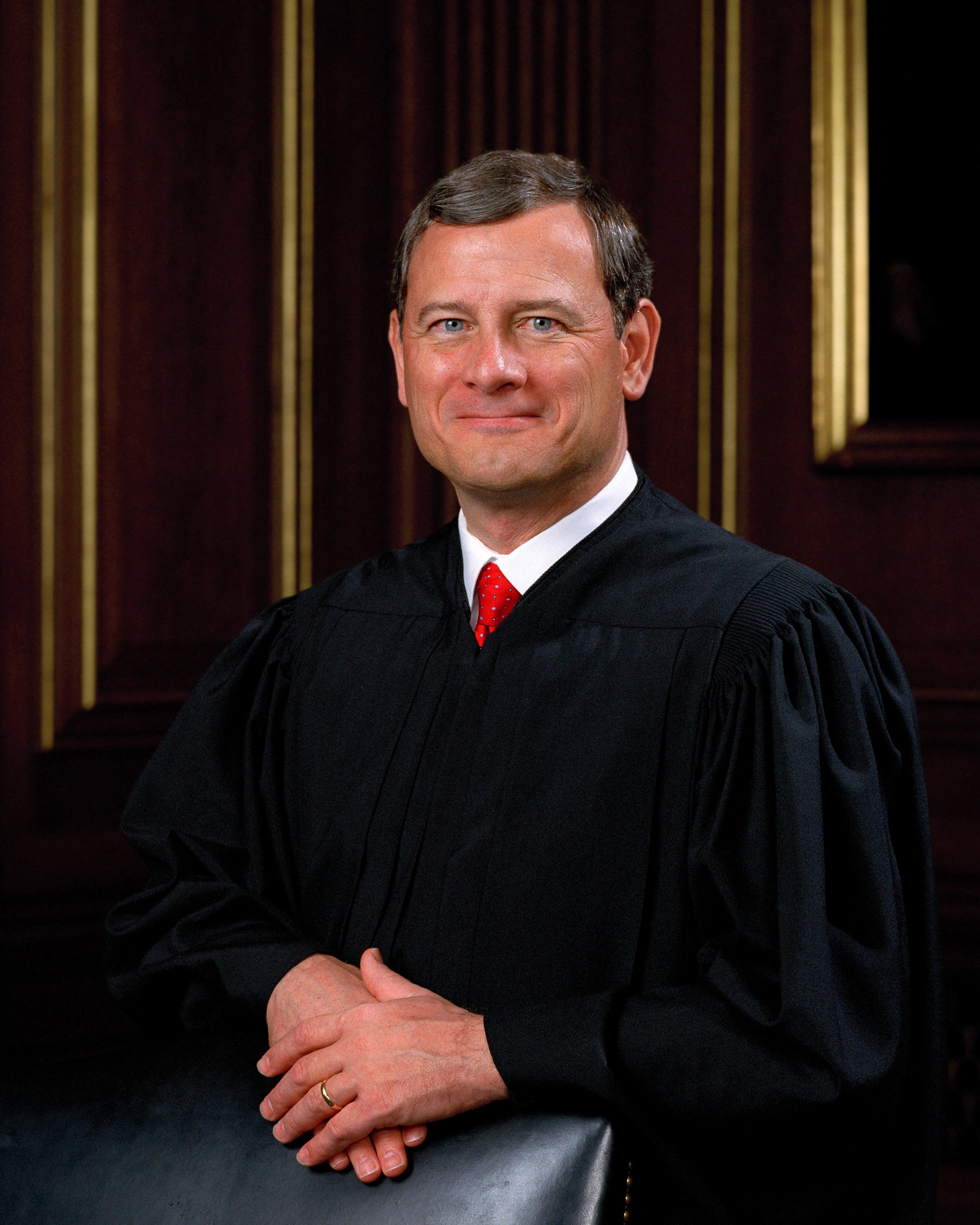
John Roberts
John Glover Roberts Jr. (born January 27, 1955) is an American jurist who has served as the 17th chief justice of the United States since 2005.[3] He has been described as having a moderate conservative judicial philosophy, though he is primarily an institutionalist.[4][5] For his willingness to work with the Supreme Court's liberal bloc, Roberts has been regarded as a swing vote.[6][7]
For other people named John Roberts, see John Roberts (disambiguation).
John Roberts
Born in Buffalo, New York, Roberts was raised Catholic in Northwest Indiana and had been educated at parochial schools. He studied at Harvard University with the initial intent to become a historian, graduating in three years with highest distinction, then attended Harvard Law School, where he was an editor of the Harvard Law Review. Before holding positions in the Reagan and senior Bush administration, Roberts served as a law clerk for Judge Henry Friendly and Justice William Rehnquist. From 1989 to 1993, he was Principal Deputy Solicitor General, after which he built a successful appellate practice and argued 39 cases before the Supreme Court.[8]
In 1992, President George H. W. Bush nominated Roberts to the U.S. Court of Appeals for the District of Columbia Circuit, but the Senate did not hold a vote on his confirmation.[9] In 2003, President George W. Bush appointed Roberts to the D.C. Circuit.[10] In 2005, Bush nominated Roberts to the Supreme Court, initially as an associate justice to fill the vacancy left by Justice Sandra Day O'Connor, but promoted him to chief justice after Rehnquist's death. Roberts was confirmed by a Senate vote of 78–22.
As chief justice, Roberts has authored majority opinions in many landmark cases, including National Federation of Independent Business v. Sebelius (upholding the Affordable Care Act), Shelby County v. Holder (defining limits on the Voting Rights Act of 1965), Carpenter v. United States (expanding digital privacy), and Students for Fair Admissions v. Harvard (overruling race-based admission programs). Roberts also presided over the first impeachment trial of President Donald Trump.
Early life and education
Roberts was born on January 27, 1955, in Buffalo, New York, to Rosemary (née Podrasky) and John Glover "Jack" Roberts Sr., both devout Catholics.[11] His father had Irish and Welsh ancestry and his mother was a descendant of Slovak immigrants from Szepes, Hungary.[12] He has an elder sister and two younger sisters.[13] Roberts spent his early childhood years in Hamburg, New York, where his father worked as an electrical engineer for the Bethlehem Steel Corporation's factory in Lackawanna.[14]
In 1965, ten-year-old Roberts and his family moved to Long Beach, Indiana, where his father became the manager of a new steel plant in nearby Burns Harbor.[15] By age 13, Roberts "already had a clear plan for his life".[16] He attended the La Lumiere School, an academically rigorous Catholic boarding school in La Porte, Indiana,[17] where he captained the school's football team, participated in track and field, and was a regional champion in wrestling. He also participated in choir and drama, and was a co-editor of the school newspaper.[15] He graduated in 1973 as class valedictorian, becoming the first graduate of the La Lumiere School to enroll at Harvard University.[18]
At Harvard College, Roberts dedicated himself to studying history, his academic major. He had entered Harvard as a sophomore with second-year standing based on his academic achievements in high school.[19] Roberts first roomed in Straus Hall before moving to Leverett House.[20] Every summer, he returned home to work at the steel plant his father managed.[15] Although he initially felt obscured among other students, Roberts distinguished himself with professors, meriting multiple distinctions for his scholarly writing.[21] He gained a reputation as a serious student who valued formalism.[20] Every Sunday, he attended Catholic mass at St. Paul Church.[22]
Roberts focused on modern European history and maintained an interest in politics.[23] As an undergraduate, he excelled academically.[15] In his first year, he won the university's Edwards Whitaker Scholarship for outstanding scholastic achievement.[21] He intended to pursue a Ph.D. in history to be a professor but also contemplated a legal career.[24] One of Roberts's first papers, "Marxism and Bolshevism: Theory and Practice", won Harvard's William Scott Ferguson Prize for the most outstanding essay by a sophomore history major.[21] An early interest in oral advocacy led him to study Daniel Webster, a prominent advocate before the Supreme Court.[25] His senior year paper, "The Utopian Conservative: A Study of Continuity and Change in the Thought of Daniel Webster", won a Bowdoin Prize.[26]
In 1976, Roberts obtained his Bachelor of Arts in history, summa cum laude, with membership in Phi Beta Kappa. A recent surplus of history graduate students convinced him to attend Harvard Law School for better career prospects, though he maintained his original goal to become a professor.[27][a] His first-year performance in law school won him membership on the Harvard Law Review. The journal's president, David Leebron, chose Roberts as its managing editor, despite their differing political views.[27] Classmate David Wilkins described Roberts as "more conservative than the typical Harvard Law student in the 1970s" but well-liked by fellow students.[20] In 1979, Roberts graduated at the top of his class with a Juris Doctor, magna cum laude, despite having to admit himself to a local hospital for exhaustion. He later regretted that during his time at Harvard he traveled into Boston on only a couple of occasions.[29]